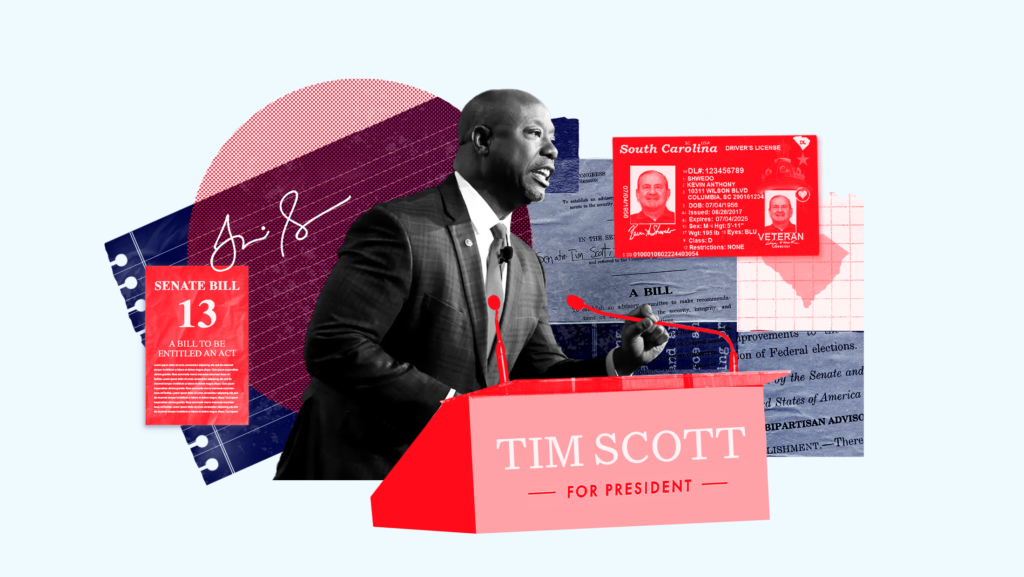Sen. Tim Scott’s Record on Voting Rights

Today, after filing paperwork on Friday, U.S. Sen. Tim Scott (R-S.C.) officially launched his campaign for the Republican presidential nomination. As Scott began gearing up for a presidential run earlier this year, he received media coverage for his supposedly “optimistic” vision for America as opposed to the culture warrior personas created by some of his competitors. But even if he differs from former President Trump or Florida Gov. Ron DeSantis’ (R) tone and messaging, he does agree with their support for restrictive voting laws.
Scott has repeatedly advocated for voter ID laws.
Voting laws were not a priority for Scott at the start of his Senate career, but since the 2020 election, he’s repeatedly advocated for laws requiring Americans to show photo IDs to vote. In January 2022, he called voter ID laws and proof of citizenship requirements “basic measures that secure our elections,” even though research has shown that ID laws can depress voter turnout and proof of citizenship requirements conflict with federal law.
Voter ID laws were also one of his key objections to congressional Democrats’ omnibus pro-voting legislation: the For the People Act and Freedom to Vote Act. Both bills would have preempted state voter ID laws by requiring states to accept a wide range of documents including utility bills or provide alternative methods for voters without an ID to vote, such as signing a sworn statement or voting a provisional ballot.
In his public statements, Scott singled out the federal bills’ provisions modifying state voter ID laws as reason for his opposition. As the Senate was considering the combined Freedom to Vote: John R. Lewis Act in early 2022, Scott took to the Senate floor and said the bill would “undermine voter ID laws across our country,” stating plainly: “I oppose that.”
While he rarely spoke about voter ID laws prior to 2020, his support for these restrictions extends back much farther. In 2013, when the Senate was considering the nomination of Tom Perez to be Secretary of Labor, Scott singled out Perez’s work in blocking South Carolina’s voter ID law from going into effect as a reason to oppose his nomination. While Scott hasn’t spent much of his career proposing voting laws, as president he would likely favor Republican attempts to impose a national voter ID requirement.
Scott indulges concerns about the 2020 election and refuses to condemn Trump for Jan. 6.
Scott has not endorsed Trump’s claims that the 2020 election was rigged, but he’s been more than willing to lend credence to concerns about fraud marring American elections. Although he voted to certify the 2020 results, he also introduced a bill to establish an election integrity commission to investigate the results, specifically charged with compiling instances of illegal voting and targeting mail-in ballot procedures. He urged Congress to “scrutiniz[e] the issues that led to millions of Americans losing trust in our election system” without acknowledging the role his own political party played in causing Americans to question voting. By proposing such a commission, Scott indicated to election deniers that their concerns about the election were to be taken seriously, despite the lack of evidence for any of their claims.
Scott’s actions around the Jan. 6 attack on the Capitol are even more concerning. Scott voted to acquit Trump during his second impeachment trial and later said that Trump was “the one person I don’t blame.” Instead, he suggested Democrats like Sen. Bernie Sanders (D-Vt.) and Reps. Alexandria Ocasio-Cortez (D-N.Y.) and Maxine Waters (D-Calif.) use language that incites violence.
Last year, Scott said he hasn’t watched any of the Jan. 6. committee hearings and that he would support Trump if was the nominee in 2024. Like many in his party, Scott has refused to assign any blame to his party’s leaders for inciting the violent attack on the Capitol.
Scott’s presidential campaign is premised on his faith in America. But that faith clearly doesn’t extend to democracy if he wants to erect barriers to the ballot box or declines to hold insurrectionists responsible for their actions.